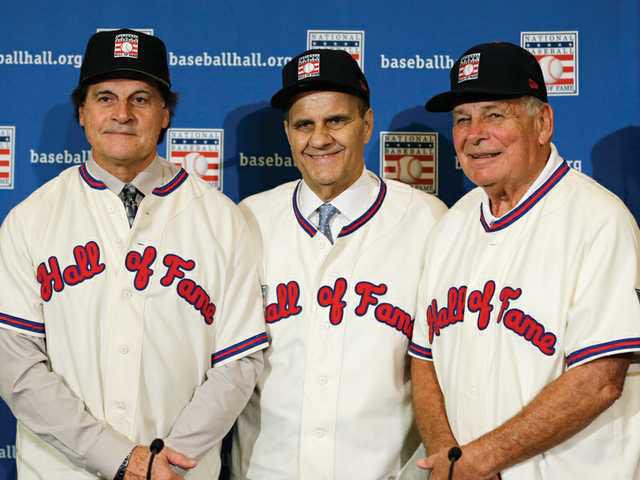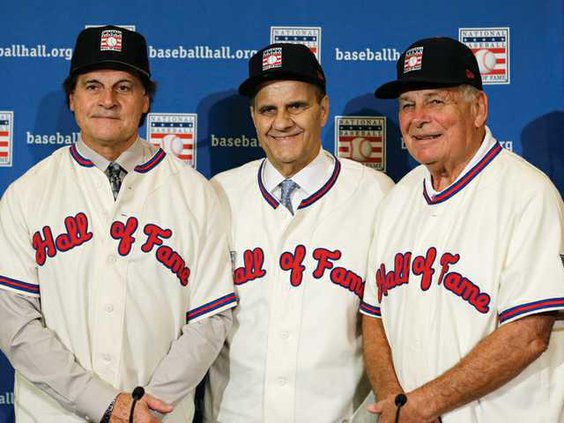ATLANTA — Bobby Cox had only a few rules.
Play hard. Be on time. No loud music or (in later years) yapping on cells phones in the clubhouse.
That formula carried the longtime Atlanta Braves manager to one of the most successful managing careers in major league history.
The 72-year-old Cox, who was unanimously elected to the Hall of Fame on Monday along with fellow retired managers Tony La Russa and Joe Torre, guided the Braves to an unprecedented 14 straight division titles and 15 playoff appearances. When he retired after the 2010 season, he was the fourth-winningest manager with 2,504 victories, trailing only Connie Mack, John McGraw and La Russa.
"The greatest manager any of us will know," longtime Braves third baseman Chipper Jones said.
The only blemish on Cox's record: The Braves captured only one World Series title despite all those trips to the postseason. Most disappointing was a loss to Torre's Yankees in 1996 after the Braves dominated the first two games in New York.
But there was no denying Cox's skills in the dugout — chomping on a cigar, a little rough around the edges, endearingly self-deprecating and always a staunch defender of his guys.
If a pitcher gave up a bunch of home runs, Cox would inevitably say the wind was blowing out — even if the flags were hanging limp around the stadium. If a fielder botched a ground ball, Cox would usually point to some sort of tricky hop that no one else saw. If a batter struck out with the bases loaded, Cox would insist he was simply the victim of a brilliant pitch that not even Babe Ruth could've touched.
He was the epitome of the "player's manager."
"One of the priorities for me is handling people," Cox said Monday. "You've got to create an environment where they're knocking down that clubhouse door when they get there in the afternoon or evenings. You want them to have fun as well as being better competitors than the other team."
As a player, Cox wasn't much — a light-hitting infielder for a couple of years with the Yankees. A rare highlight came in 1968 when his throw across the diamond to Mickey Mantle completed a triple play; the Yanks didn't turn another one for 42 years.
Managing, it turned out, was his true calling.
Cox landed his first big league job with the Braves in 1978, lasting four years — with only winning season — before he was fired by owner Ted Turner. It would go down as one of Turner's biggest regrets, one he rectified after Cox guided the Blue Jays to the AL East championship in 1985. '
Lured back to Atlanta as general manager, Cox oversaw a dismal era in the late 1980s — including a 106-loss season — but began hoarding young pitchers. Most notably, he dealt veteran Doyle Alexander to the Detroit Tigers for a minor leaguer named John Smoltz.
Cox soon returned to the dugout and gave up the GM duties to John Schuerholz. They were a duo that blended perfectly, opposites in appearance but always eye-to-eye when it came to baseball. Atlanta went from worst to first in 1991, losing to Minnesota in a classic seven-game World Series. The Braves would win their division in every completed season through 2005, a remarkable record that may never be broken.
Behind aces Greg Maddux and Tom Glavine, Atlanta captured the 1995 championship. Both pitchers are on the Hall ballot for the first time, with results to be announced in January. Cox hopes all three can go in together.
After a few down seasons, Cox announced that 2010 would be his last. The Braves sent him out with his 16th playoff appearance (counting that first one in Toronto), but Cox's career ended like so many other years — with a loss to San Francisco in the divisional round.
The Giants, in the ultimate sign of respect, tipped their caps to Cox.
"I miss the competition," he said. "I miss when the umpire says 'play ball!' I really, really miss that."
While Cox largely relied on his players to govern the clubhouse, there was never a doubt about who was in charge.
When a young Andruw Jones loafed after a ball, Cox yanked him from the game, forcing him to make an embarrassing run to the dugout right in the middle of the inning. Cox made his point. Jones never repeated that mistake. In fact, toward the end of his long career with the Braves, both he and Cox disputed that it ever happened, a sign of the admiration that grew between Cox and so many of his players.
The rare player who resisted Cox's team-first approach didn't last long in Atlanta. Just ask John Rocker, an imposing closer but loud-mouthed disruption before he was dealt to Cleveland for a couple of journeyman pitchers, undoubtedly with the manager's blessing.
Cox constantly griped at umpires from the dugout and set a major league record with 159 career ejections, a somewhat comical figure whenever he waddled out of the dugout on two surgically replaced knees, waving his arms and shouting a stream of obscenities.
But he always remained on good terms with the guys in blue. Umpires knew it was never personal with Cox.
"The umpires have the utmost respect for Bobby Cox," longtime arbiter Richie Garcia once said. "He doesn't carry things over. What happens one night isn't carried over to the next."
Cox never held grudges, either.
On his first day of retirement, he ran into infielder Brooks Conrad, whose three errors in Game 3 of that playoff series against the Giants helped shorten Cox's career.
The two hugged, and Conrad asked his now ex-manager if could sign a few pieces of memorabilia.
"I'll sign anything you want," Cox said.

